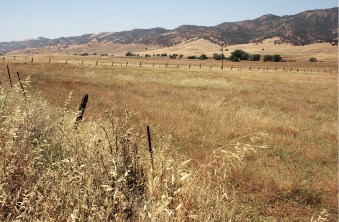 (Left) The proposed Sites Reservoir would be built on this land in the Sacramento Valley. The reservoir is among storage projects seeking partial funding from the Proposition 1 water bond.
(Left) The proposed Sites Reservoir would be built on this land in the Sacramento Valley. The reservoir is among storage projects seeking partial funding from the Proposition 1 water bond.
Photo/Christine Souza
Following a second round of scoring, Water Commission staff determined last week that eight of 11 projects would be eligible for $2.6 billion in bond funds, a significant increase from the $942 million eligibility amount issued by staff in February.
"Californians clearly voted for new water storage when they overwhelmingly approved Proposition 1, and we urge the Water Commission to make a significant investment in new water storage," California Farm Bureau Federation President Jamie Johansson said. "Several steps remain before the final finding decisions occur, and we expect backers of individual projects will continue to make strong cases for the public benefits of storage."
California voters approved the $7.5 billion Proposition 1 water bond at the height of the most recent drought in 2014, including $2.7 billion to fund the public benefits of new water storage projects.
Under the bond's Water Storage Investment Program, administered by the Water Commission, projects receive scores according to the public benefits they would bring, including ecosystem improvements, water quality improvements, flood control, emergency response and recreation associated with the proposed projects. Review teams included subject matter experts from the California Department of Fish and Wildlife, Department of Water Resources and State Water Resources Control Board.
Water Commission spokeswoman Lisa Lien-Mager said at technical meetings this week, staff will "walk folks through the latest round of responses on the public benefit ratio appeals, so they can understand and identify any issues that need further clarification."
Lien-Mager added that the commission is expected to make a final determination of the public benefit scores at its meeting next week.
The Sites Project Authority, applying for $1.39 billion in funding for the construction of Sites Reservoir—a large, off-stream storage project in Glenn and Colusa counties—noted that the project's public benefit score increased following the review. The eligibility amount for the project increased from $662 million to $933.3 million, after proponents provided additional information about the project's environmental benefits for salmon and delta smelt.
Sites proponents had appealed an earlier public benefit ratio score of 0.4. Last week ,the score increased to 0.67.
"The Sites Project offers the state an opportunity to manage a significant amount of water to benefit wildlife and native fish in the Sacramento watershed," Sites Project Authority Chairman Fritz Durst said. "We are pleased to have received credit for our benefits to delta smelt, and that the Sites Project is now eligible for $933.3 million. We think there is still room for discussion with the commission about the benefits we offer for salmon. We greatly appreciate the work done by staff and look forward to continuing to make our case with the commission in May."
The San Joaquin Valley Water Infrastructure Authority is seeking $1.06 billion for the proposed Temperance Flat Dam and Reservoir, on the San Joaquin River upstream from Friant Dam in Fresno and Madera counties. Proponents appealed an earlier low public-benefit ratio score and the score improved slightly, which means the project would be eligible for $171 million.
Mario Santoyo, executive director of the San Joaquin Valley Water Infrastructure Authority, said there is still time for the authority to make its case before the commission and improve its public-benefit score.
"This second revised score by staff is not the last word on the public-benefit ratio, but clearly sends a message that, at least from staff level, they do not understand the cry by the public who passed Prop. 1 in terms of meaningful, big water storage projects for the future," Santoyo said. "The system was supposed to make a difference for California for future droughts."
The Contra Costa Water District requested $459 million to expand the existing Los Vaqueros Reservoir, situated southwest of the Sacramento-San Joaquin Delta in Contra Costa County. The district improved its earlier public benefit ratio score of 0.46, which increased to 1.77. The staff recommended an allocation of $423 million.
Along with Los Vaqueros, the other highest public-benefit score went to the Pacheco Reservoir Expansion Project proposed by the Santa Clara Valley Water District, which was recommended for the $485 million amount requested.
The Water Commission is scheduled to make final funding decisions in July.
Learn more about the water projects and scoring by Water Commission staff on the WSIP Project Review portal at cwc.ca.gov/Pages/WSIPSummary.aspx.
(Christine Souza is an assistant editor of Ag Alert. She may be contacted at csouza@cfbf.com.)
Source: Reprinted with permission: California Farm Bureau Federation









